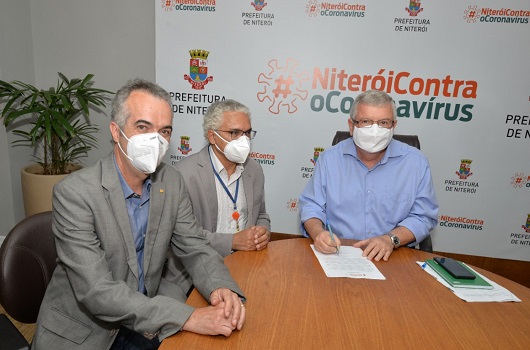Wolbachia Method reduces cases of dengue, chikungunya and zika in a city of Rio de Janeiro
31/08/2021
Guilherme Costa (WMP Brazil)
The release of Aedes aegypti mosquitoes carrying Wolbachia in Niterói, in the state of Rio de Janeiro, which began as a pilot action in Jururuba, in 2015, and covered 75% of the city’s territory, has already yielded positive effects. Data released this Thursday (August 26th) by the Wolbachia Method, an initiative of the World Mosquito Program (WMP) led by Fiocruz in Brazil, indicate a reduction of about 70% of cases of dengue fever, 60% of chikungunya, and 40% of zika in the areas where the entomological intervention took place.
Niteroi's mayor, Axel Grael (right), Valcler Rangel from Fiocruz, and the researcher Luciano Moreira (Photo: Flávio Carvalho, WMP Brasil/Fiocruz)
“These figures are published in a scientific paper and corroborate data from the World Mosquito Program in other countries, such as Indonesia, where cases dropped by 77% and hospitalizations fell by 86%. We are pleased to be able to celebrate, now with the population of Niterói, the success of this initiative”, emphasized the leader of Wolbachia Method in the country and Fiocruz researcher, Luciano Moreira.
Last Thursday morning, Moreira met with the mayor of Niterói, Axel Grael; with Valcler Rangel, Fiocruz’s coordinator of Inter-institutional Relations; Alessandra Siqueira, director of the Department of Science and Technology; Cássio Peterka, deputy director of the Department of Immunization and Communicable Diseases, both from the Ministry of Health; and with Carlo Melo, Pan American Health Organization (PAHO) consultant, to present the data. On the occasion, a letter of intent was signed between the Local Government of Niterói, Fiocruz, and WMP Brazil, to make sure the methodology is applied throughout the municipality.
Wolbachia is an intracellular microorganism present in 60% of insects in nature, but it was not present in Aedes aegypti. When present in these mosquitoes, it prevents the viruses of dengue fever, zika, chikungunya and yellow fever from developing within the insect, therefore helping to reduce the rates of these diseases. The Wolbachia Method consists in releasing Aedes aegypti with Wolbachia so they mate with local Aedes aegypti and therefore establish a new population of these mosquitoes, all carrying Wolbachia. There are no genetic modifications involved in the process. Over time, the percentage of mosquitoes carrying Wolbachia increases, until it remains high without the need for new releases, which is the case of the areas of intervention in Niterói.
Wolbachia Method in the municipality
In Niterói, the method began to be implemented in Jurujuba, in 2014. Up to this moment, 33 neighborhoods were involved, reaching a total of 373 thousand inhabitants. This area corresponds to about 75% of the city. Mosquitoes with Wolbachia are now established in the area, and no other releases are scheduled. About 750 volunteers participated directly in the work, hosting a mosquito trap at home or at their business. Community health agents, agents in the fight against zoonosis, and the remaining teams of the Family Health Program were crucial for the implementation of the method in Niterói.
Local teachers and social leaders also played an important role in engaging the population. It is possible to follow the Wolbachia Method and access the scientific paper with the detailed results for Niterói. Follow @wmpbrasil on Instagram.




